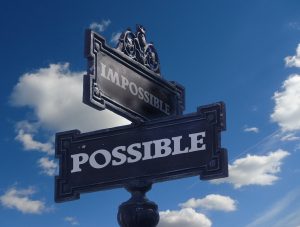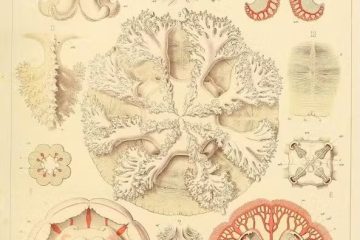When a Pandemic Makes the Impossible, Possible
By Dion Forster

What has been particularly interesting for me in this coronavirus pandemic is how things that we believed were impossible, suddenly became possible. I call them “possible impossibilities.”
Can you imagine just a year ago that international travel could be almost entirely halted? Or, that some of the world’s busiest tourist cities—New York, Paris, Venice, and many others—would look like deserted movie sets? Then there are the economic “impossibilities.” One of the world’s most fiercely productive nations, China, shut down the majority of its factories for months, only allowing work to continue on essential goods and services.
Politically, there have also been a few unanticipated “impossibilities.” In reaction to the threat of the coronavirus, Israeli prime minister, Benjamin Netanyahu, offered help to Palestine. This is in part because the coronavirus has no political loyalties. It infects Israelis and Palestinians alike, and blockades are no defense against it. Of course, history is full of accounts of nations not helping adversarial neighbors even as a form of “enlightened self-interest.” So Israeli efforts, by ordinary citizens as well as by their government, is a “possible impossibility” nonetheless and an extension of concern for other human beings.
Our current circumstances remind me of the refrain from the song “Crush” by the Dave Matthews Band: “Here I’m dancing on the ground/Am I right side up or upside down/Is this real or am I dreaming?”
For some, the enormity of the crisis introduced by the coronavirus pandemic has numbed them to the historical significance of these “possible impossibilities.” Most people are simply trying to survive—that is enough. However, it’s worth asking how what was once considered impossible suddenly became possible.
Of course, crises do have a tendency to disrupt what is considered possible, or “normal.” Albert Camus’s haunting 1947 novel, The Plague, tells of the sudden, devastating arrival of the bubonic plague in an Algerian city called Oran. The book describes how the city faces the disruption of normality, but as literary critic Lisel Schillinger suggests, Camus’s intention is to illustrate how abnormal some aspects of normal life actually are. The metaphor of infection reveals how quickly contagions can spread and cause death and destruction. The contagion need not be a virus. It could be a set of ideas, like unchecked capitalism, xenophobia, exceptionalism, nationalism, or hedonism, to name a few.
As with the citizens of Oran, our current crisis is inviting us to reconsider some ideas. What is normal and what is not? What is possible and what is not?
Is the ease with which we hopped on flights, drove our cars, or participate in meetings “normal” human living? Is it “normal” for human thriving that some have much while others don’t have enough to survive? Is it normal that while we have the technologies to save lives, some have access to them while others do not owing to financial lack?
Perhaps this is not a question about what is normal but about whether what we have considered “normal” is morally defensible. Is this how we want to go on living? Might we imagine a different way of life that is more sustainable, more just, and more equitable?
Norms tend to remain unquestioned until some significant event calls them into question. Why is that so? Camus points us to a social change agent more powerful than reason: the imagination.
Some contemporary ethicists and philosophers claim that we shape our lives according to a sort of “cultural imagination.” Graham Ward, a Professor at Oxford University, says that the cultural imagination is a set of unquestioned beliefs, values, and social commitments that societies adopt over time. The “cultural imagination” shapes what we think is possible and impossible. It informs how we believe we should live, act, and engage socially.
Why do women dress in certain ways, and men in others? Why are certain things considered polite or respectable, while others are not? Why do we want to own certain products, live in certain places, or be included in certain social circles? These are all aspects of our cultural imagination. We imagine what constitutes a good life, and we structure our own lives and our societies accordingly.
The Canadian philosopher Charles Taylor uses a term slightly different from Ward’s: the “social imaginary.” The “social imaginary” constitutes those sets of beliefs, ideas, and values that shape the way people “imagine” that their “social existence” functions or should function. These “social imaginaries” are not universal or set in concrete. Neither do they remain static throughout history. What is acceptable in one context may be unacceptable in another, and what was considered necessary at one point in history may be considered barbaric in another. Social imaginaries are expectations of life that are held by persons and communities in a certain time and place.
Throughout history, certain individuals and groups have had the courage to question unquestioned norms and structures, such as class structures, gender identities, oppressive systems based on race, and even aspects of social dominance and legitimacy (such as dominant political views or economic systems).
We are once again at such a time in history. The impossible has become possible. Last week Slavoj Žižek released a book in record time—even by his standards: Pandemic! Covid-19 Shakes the World. After unmasking the social imagination that serves as the “software” (beliefs, ideas, commitments) that allows the “hardware” (societies, governments, businesses) to function, some in unsustainable, unjust ways, he points to some possibilities for change.
He cautions that we should not let our desire to survive Covid-19 override these possibilities. There is much more than mere survival at stake. What he proposes is that the imagination that has been activated by this crisis points to the possibility for real change. As we are facing this “mortal threat,” we are also imagining the possibility of a new humanity.
It is unlikely that we will ever return to what we considered normal before the coronavirus pandemic. That is not all bad. We are being forced to find new, creative ways to live with, and beyond, the coronavirus pandemic. For a better humanity, maintaining some of the “possible impossibilities” brought about in response to Covid-19 will take courage, a critical self-awareness, and an imagination for what could be possible.
#
Dion Forster is Professor of Ethics and Public Theology at Stellenbosch University. He is the author of numerous books and articles in theology and ethics. His research focusses on social ethics, economic ethics, and political ethics. Dion is the director of the Beyers Naudé Centre for Public Theology. See: http://www.twitter.com/digitaldion.
Counterpoint blogs may be reprinted with the following acknowledgement: “This article was published by Counterpoint Navigating Knowledge on 29 April 2020.”
The views and opinions expressed on this website, in its publications, and in comments made in response to the site and publications are those of the author(s) and do not necessarily reflect the views and opinions of Counterpoint: Navigating Knowledge, its founders, its staff, or any agent or institution affiliated with it, nor those of the institution(s) with which the author is affiliated. Counterpoint exists to promote vigorous debate within and across knowledge systems and therefore publishes a wide variety of views and opinions in the interests of open conversation and dialogue.




1 Comment
Compassion fatigue is normal during abnormal times – News Daily Africa · September 28, 2020 at 1:01 AM
[…] citizens of Oran start to normalise their lives. Camus, however, uses his novel to illustrate how abnormal some aspects of their normal lives actually […]